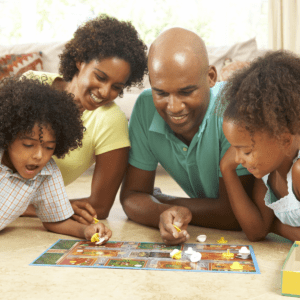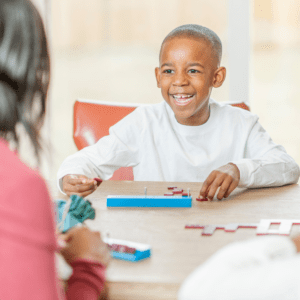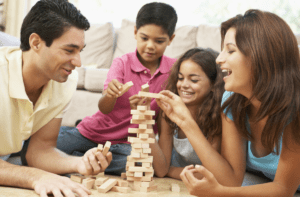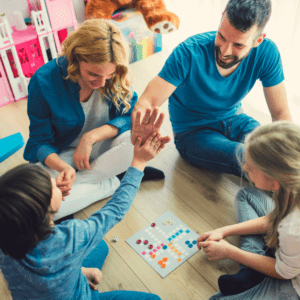Family game night is a great way to practice social skills in a supportive environment while having fun! Building strong family connections also boosts youth mental health.
How to use this resource
This resource breaks down important social skills like conflict resolution, communication, and understanding others’ perspectives or points of view.

Building Communication Skills
Playing games helps improve communication. You and your child can practice while playing – work together, talk through moves, and use body language to guess your opponent’s next move. Conflicts during game play are perfect for practicing assertive communication: communication that is both clear and respectful.
Tips:
- Model active listening: make eye contact, avoid interrupting, limit distractions, and ask questions.
- Set guidelines on what positive communication looks like during games. Here are some ideas:
- No name calling or insulting other players
- Encourage each other during hard times with phrases like, “You got this!”
- Celebrate success with phrases like, “Great work!” or “Smart move!”
- Think about how everyone can provide helpful feedback to one another. Try the sandwich method, which starts with something they’re doing well, then a suggestion for what could be done differently, and then another positive comment.

Suggested Games:
Games best for practicing communication include:
- Charades
- 20 Questions
- Chain Link Story or Group Storytelling
- Telephone
Building Empathy and Perspective Taking (seeing others’ point of view)
Empathy and understanding others’ feelings and viewpoints help us to put ourselves in the shoes of others. These are key to good social skills because they help you understand what the other person wants and needs. It can also help us be more aware of the impact of our own actions. Playing games together helps you see things from others’ perspectives and can make us better players.
Tips:
- Let everyone share their ideas or what they think your team should do next.
- In games that require strategy, pause to talk aloud and reflect. Ask questions like:
- “What do you think is the problem?”
- “How might the character be feeling about this problem?”
- “Did anyone see this differently?”
- “What do you think we should do next? What might happen if we do that?
”
Suggested Games:
Games that help practice empathy and seeing others’ points of view include:
- What Would You Do?
- Role playing games
- Narrative video games
Building Trust and Practicing Setting Boundaries
Trust and boundaries help us to feel safer and more comfortable sharing our feelings and can help stop conflicts from getting worse. Games are a great way to practice this. Learning to trust one another will lead to safer, more successful, more joyful play.
Tips:
- Review and change the game rules together. Make sure everyone understands the rules.
- Talk about – and agree to – fair play and good sportsmanship. Examples of good sportsmanship might include things like following all rules, encouraging other players, being humble after winning, and being a “good” loser by accepting the loss and congratulating the winner.
- Ask your child about their boundaries on competitiveness, language, and behaviors while playing.
- Set consequences for cheating, rule breaking, or showing poor sportsmanship. Hold each other to them! This could be a warning, skipping a turn, or no longer being able to play the game.
Suggested Games:
Games that build trust and help set boundaries are games such as:
- Trust walk or trust fall
- Two truths and a Lie
- Blindfolded games: blindfolded maze walk, pin the tail on the donkey
Building Self-Regulation

Self-regulation is how a person responds to the world around them. Practicing self-regulation skills helps us handle strong feelings, like excitement or anxiety about a game or losing.
Tips:
- Remind your child about good sportsmanship.
- Offer support if someone gets frustrated.
- Take breaks to ease tension and come back to the game when everyone is feeling ready.
- Model positive self-talk such as “Whoops! Maybe I’ll have better luck next time.”
- Take deep breaths together during setbacks or mistakes.
Suggested Games:
For games that build self-management skills, search for games that practice handling emotions and controlling impulses such as:
- Freeze Dance
- Musical Chairs
- Simon Says
- Jenga

Building Teamwork and Collaboration Skills
Playing games together helps practice compromise, negotiation, and creative thinking.
Tips:
- Help your child to see other people’s perspectives during a conflict.
- Model being a neutral mediator. You can do this by helping to summarize what each person has shared, identify common ground, and giving options for moving forward. You may also choose to call for a break if tensions are high.
- Decide on roles for game play. This is also a great way to help your child identify their strengths!
- Debrief after the game on what went well and what could be better next time.
Suggested Games:
Games that build teamwork skills will be those that need negotiation, critical thinking, and shared decision-making such as:
- Trivia
- Monopoly
- Escape room-type games
- Legos or puzzles
